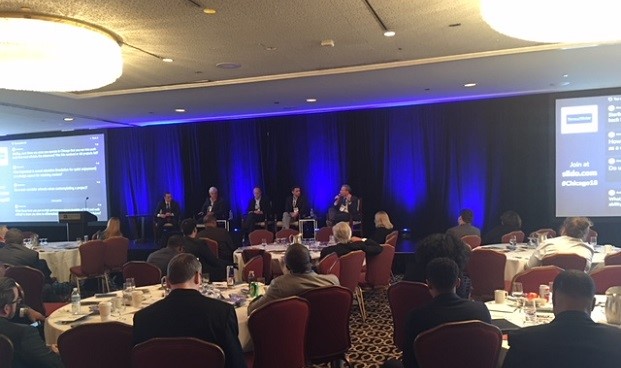
CHICAGO—New multifamily development has been springing up for the past few years throughout many Chicago neighborhoods, and the suburbs recently saw a big jump in the number of projects underway. But many new opportunities remain, especially for transit-oriented developments, according to speakers at Marcus & Millichap's Multifamily Forum, held last week at Chicago's Mid-America Club.
And those opportunities are not all in the city. Richard Matricaria, senior vice president and division manager, Marcus & Millichap, moderated a panel on emerging neighborhoods in the Chicago metro area, and asked Tim Anderson, chief executive officer, Focus Real Estate, what the prospects were for the suburbs.
“Chicago is blessed with whistle stops,” Anderson said, meaning towns that grew up in the past century beside the railway lines that radiate out from downtown. That means most have excellent locations perfect for transit-oriented developments. Furthermore, “these communities still have good downtowns.” Focus recently sold Courthouse Square, a development in Wheaton that it opened in 2016, and also has another project underway in Lake Forest. Both towns have relatively dense downtowns with great walkability. But Anderson cautions that it is not easy to develop suburban sites. It took about two years, for example, to get through the entitlement process for a project in suburban Evanston. “You have to wade in carefully.”
Although some have started wondering if the market was seeing too much construction, there are signs that the demand for multifamily has staying power. Daniel Slack, principal, Baker Development Group, pointed out that many renters have started to sign long-term leases. “I don't know if it is a trend,” but at its new ELEVATE, a 191-unit community on Lincoln Ave. in Lincoln Park, roughly 60% to 70% of the occupants signed long leases. “It is a surprise,” but this group tends to be more mature than the type of renters such a project would have attracted a decade ago, and therefore, less transient. “They can stay put for a while.”
Some headwinds are starting to blow. John McLinden, managing partner and founder, Hubbard Street Group, said it would be difficult to replicate its recent transit-oriented developments due to costs. Construction costs, for example, both for materials and labor, have gone up, along with land prices. Chicago's new affordable housing ordinance has boosted costs as well. Therefore, even though many projects will reach completion this summer, “I think you will see a fall off after that.”
Still, new possibilities keep opening up. Sterling Jawitz, head of real estate strategic partnerships, Common, said ride sharing companies like Uber and Lyft are changing the notion of transit-oriented development. Use of these companies' services has quadrupled in Chicago in just three years, according to city data, and residents of many developments regularly hop into one of these cars for a quick 10-minute dash to a nearby train station. Renters that need daily access to train lines may no longer need to cluster so close to Metra or subway stations.
McLinden echoed Jawitz's comments. “Lyft and Uber will have a dramatic effect on the city.”
Want to continue reading?
Become a Free ALM Digital Reader.
Once you are an ALM Digital Member, you’ll receive:
- Breaking commercial real estate news and analysis, on-site and via our newsletters and custom alerts
- Educational webcasts, white papers, and ebooks from industry thought leaders
- Critical coverage of the property casualty insurance and financial advisory markets on our other ALM sites, PropertyCasualty360 and ThinkAdvisor
Already have an account? Sign In Now
*May exclude premium content© 2025 ALM Global, LLC, All Rights Reserved. Request academic re-use from www.copyright.com. All other uses, submit a request to [email protected]. For more information visit Asset & Logo Licensing.








